
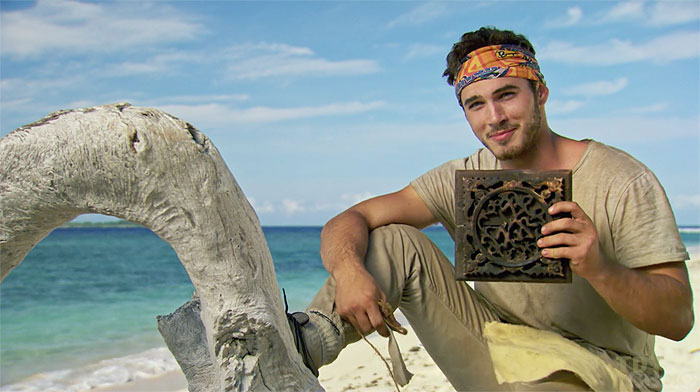
In this week's swap episode, Survivor: Ghost Island showed just how deep its cast is, and how rich and satisfying its callbacks to past seasons can make the experience for contestants and fans alike.
This episode's historical relic materialized on one of the two post-swap tribes (Malolo), where the original Malolo tribemates found themselves outnumbered by original Naviti tribe members, 5-4. While the majority Bradleys and Kellyns on that tribe relaxed in the shelter (to the extent the horrific, dirt-encrusted conditions of that shelter allowed), the original Malolos searched high and low for salvation, and eventually found it, in the form of one of the two hidden immunity idols that James Clement was holding when he left Survivor: China.
The previous Survivor relics that have been doled out have been a bit underwhelming, but here, production's decision to relocate and reuse key artifacts from prior seasons really paid off. While Jacob and Morgan both dutifully gushed over and fondled the Game Changers Legacy Advantage, it's hard to believe they really that nostalgic about a piece of Survivor history... that they had just seen on TV, mere weeks earlier. Andrea's idol from Caramoan was older, sure, and Andrea is a popular player, but it was hardly a key, immediately recognizable piece of Survivor history, especially considering it originally appeared and then was removed from the game (along with Andrea) within a barely 30-minute span of a single episode.
Not only was this China idol itself something special, but the find was appropriately appreciated because Michael Yerger (previously known solely as "the 18-year-old pretending to be 23") is an actual longtime fan of the show. Michael showed genuine excitement just to be holding this, a legitimate Survivor trophy from a classic season, which also just happened to be the first season Michael had ever watched. Having that same, comically oversized item ("Nope. Not today. No #crotchidol hashtag for you.") become a key weapon in Michael and his allies facing the otherwise grim prospect of a face-off with an opposing alliance's superior numbers? That's far more meaningful than some random shell-and-cord combo the art department whipped together in a couple of minutes.
Another rich element to this idol find: The timing. James was handed his first idol (the one Michael actually found) after a poorly conceived (and never repeated) swap mechanism sent him and Aaron Reisberger from the powerful Fei Long tribe to the flailing Zhan Hus, who promptly threw their first immunity challenge and booted Aaron. The next episode, James was handed Fei Long's idol by Todd Herzog, as future protection against this happening again, then took possession of the matching idol back at Zhan Hu camp. What's great is that Michael and the Malolos were facing a similar set of circumstances here—a post-swap tribe where they were at the mercy of the majority Navitis. Further extending the parallels, just as with James, after getting the idol, they promptly won tribal immunity, and avoided needing to use it. But with an unknown number of Tribals left before the next swap or the merge, there's a good chance a China idol will finally be played sometime in the future.
Depth perception - the contestants
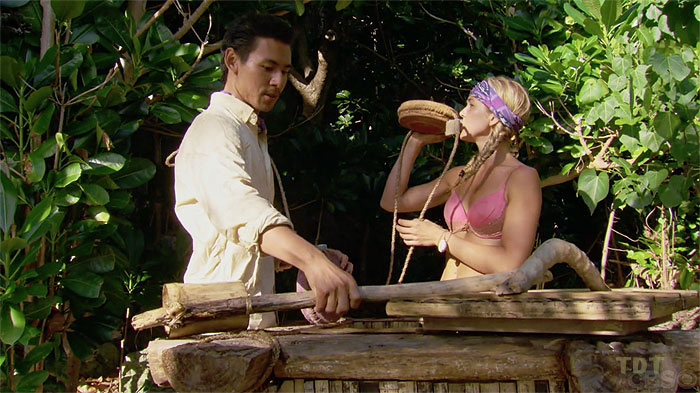
This was also an episode that saw the key strategic decision-making revolve around two of the few non-superfans in the cast: James Lim, who came over from the Amazing Race casting pool, and Libby Vincek, who was recruited. James and Libby were both newly relocated from the Malolo tribe into the post-swap Naviti tribe, where they also found themselves outnumbered 5 to 4. But two things happened here to shake things up: First, luck prevailed, as a rock draw sent (original Naviti) Chris to Ghost Island, leveling the numbers at 4-4. (This, the prospect of a simple rock draw being capable of disrupting strategic planning each episode, is perhaps the best thing yet to result from Ghost Island's presence in the season.) Secondly, James astutely capitalized on clear intra-Naviti division, realizing that Malolo's four votes were sufficient to send home a Naviti of their choosing, since Domenick, Morgan, and Wendell all seemed intent on voting against their nominal ally, Angela. Maybe it helped that James had binge-watched Survivor's back-catalog before playing, or maybe Harvard-educated James is just smart enough to figure out this game on the fly. Either way, James made a strong case that he's not just here to fill a slot, but that he came to play.
What's more, this move took out Morgan, a strong challenge competitor with numerous allies, who seemed like exactly the type of personable, well-rounded, well-liked player who has no problem making it at least as far as the merge. First, however, James had to convince Libby to sever her fledgling ties with Morgan. Libby, who had also binge-watched the show after being cast, had previously shown she was also aware of the many layers of social and strategic play, via a confessional in which she described smiling and nodding in response to Chris's demands that his new ex-Malolo tribemates get on board with voting out Domenick. Libby's understandable reluctance to target her new friend Morgan made the success of this move seem tenuous at best until the votes were read. In the end, sticking with her original group was probably a good early-game choice.
But the more important development here is that, well, James is a buffed-up recent college athlete, while Libby is a model. These are casting slots usually filled by recruits who are mostly playing Survivor to secure future modeling/acting gigs, maybe land some sort of ad campaign, launch an album, or whatever it is the Hope Driskills and Jay Byarses of the world do with their post-show selves. Rarely do these people amount to much in terms of gameplay. But here James and Libby are, driving the action. Part of the reason Millennials vs. Gen X was so fun in the post-merge was because almost all the people left were fans of the show who simply enjoyed playing Survivor. If the non-superfans here can also provide that kind of spark, that's a great sign for this season.
Prospects: Rising and falling

A number of contestants burst into the edit (Angela, Bradley, Libby) or faded into the background (Donathan) this episode, and several saw their winning prospects seemingly change dramatically, based on the ways in which they were shown. A few of these:
- Alas, poor Morgan: She didn't really do anything wrong, she was simply collateral damage from Domenick's attempted idol chicanery and Chris's hard-charging alpha-malery. And because Laurel didn't want Wendell taken out (neither did we). We got to see very little of Morgan, but her confessionals seemed animated, and she was great in challenges. An unlikely early boot, but sometimes these things happen (see also: Hunter Ellis).
- Wendell takes a tumble: When new Naviti arrives in camp, Wendell confidently announces that this tribe will not be attending Tribal Council any time soon. Later, he tells Probst to "shut up" while floundering during the IC (hilarious, but probably not a good sign for winning). Then Wendell hatches the plan to blindside Angela, which directly results in his ally, Morgan, getting blindsided herself. All in all, not a great episode for Wendell. Weirdly, he did almost everything right, yet it all came out so wrong. What happened? Hopefully he and Domenick can pick up the pieces of their games and craft a small side table out of them, or something, during the next episode.
- Plusses and minuses for Kellyn: She came into the game promising "empathy is my superpower." So immediately after the swap, who's telling Stephanie and Jenna that "None of us are going to flip on purple, so... sucks for you guys to be (down) 5-4"? You guessed it, it was Kellyn. Luckily, the challenge featured a puzzle, so Kellyn and Bradley were able to save themselves. Kellyn seemed all-around delightful elsewhere, but this was not her finest hour, Survivor-wise.
- Libby rises: While James got the (deserved) editing credit for the Morgan blindside, Libby also emerged this episode as a (potentially) potent force in the game. She talked in confessional about smiling and nodding at Chris while enduring his strategic talking-at. Perhaps a key clue for her longevity: Morgan called her out ("Don't trust the blonde") while exiting Tribal, whereas Brendan received a similar retort from Gonzalez after her boot ("One wolf, seven sheep") that was allegedly cut from the edit, according to first-hand witnesses.
- Domenick's bag of... illusions: Another week, another fake idol. (And at the end of the episode, another actual, albeit rather limited, idol.) Domenick is finding very little traction for his attempt to change the game with idols galore. His main problem is that, since they're playing immediately after Game Changers, Tony Vlachos is once again fresh in everyone's minds. So anything Domenick says or does is immediately suspicious. So instead of Tony Wonder, he's coming across as a master of illusions on the order of GOB Bluth. Dom's a perceptive, creative guy who knows the game, and his approach certainly could work, and maybe with a different cast it would. It'll be fun to watch him actually deploy some of his accumulated hardware at Tribal, but until then, let's hope he can at least avoid winning Poof's Goof of the Year.
- Surfing Stephanie: In terms of winner's edits, Stephanie's zen approach to the swap, which knocked her from a position of power down to a 5-4 minority, was a really good sign. From Boston Rob in Redemption Island to Cochran in Caramoan, the relaxed, calm player often ends up winning.
Was this swap really early, and will the new tribes stick together?
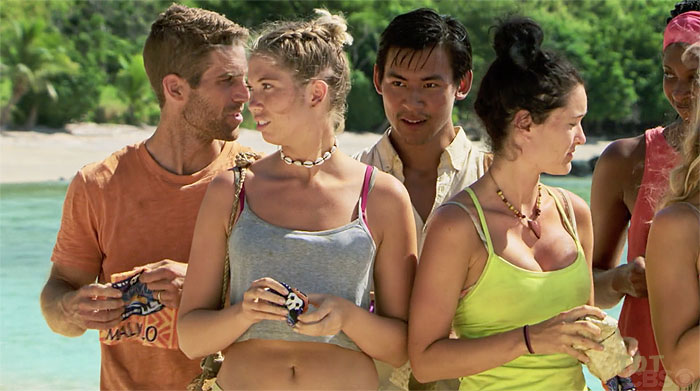
From a production point of view, there are potentially two goals in a swap. One is to simply mix things up: keep the players on their toes, shake up ossifying power structures via ye olde deus ex machina, perhaps even knock a smug entrenched leader of their perch, or rescue a small number of hopelessly outnumbered people languishing in minority alliances. The other reason for a swap is to introduce more options for the gameplay going forward. Maybe break up some Day 1 alliances, and give people the opportunity to work with people they otherwise wouldn't have met until the merge, when it might be too late. Having less-rigid alliances helps prevent boring Pagongings, and in the age of the voting blocs/ trust clusters (which is, roughly, Cambodia through MvGX, skipping Kaoh Rong, so... now-ancient history), that's ideal in the post-merge.
So you'd think option two sounds like the best of all worlds, right? Unfortunately, it almost never works.
In fact, in looking back at all 24 times (prior to this season) a tribal swap has taken place, there are maybe four examples where it worked really well, and at least two of those were partly due to an unsustainable initial theme (read: four tribes, with gender-plus-age divisions in Panama, ethnicity-based tribes in Cook Islands). But there is another trend: They also happened early (or really late, in the case of The Amazon, where the separation-by-gender theme helped stoke desire for a tribal mix-up that could not come soon enough for the young men of Tambaqui). Could that be the key to long-lasting, "productive" swaps?
First, let's take a look at the distribution of days of a season's first swap over Survivor history:
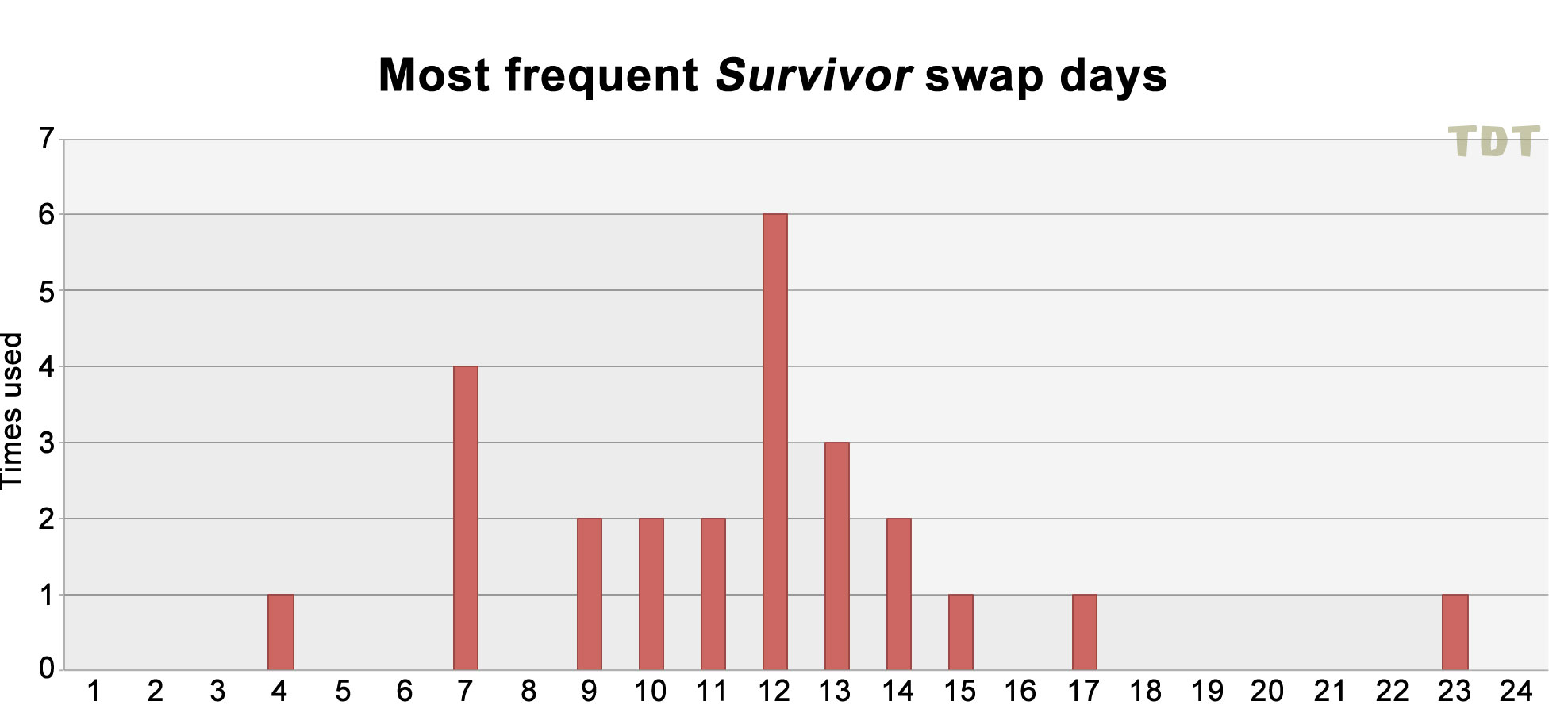
You'll notice that by far the most-used day for a swap is Day 12. It's been done six times (Micronesia, Nicaragua, One World, Cagayan, Worlds Apart, Kaoh Rong). How many times were those post-swap tribes places that forged a lasting alliance that went on to control the game? Roughly zero. In contrast, look at some of the earliest swaps: Day 4 (Panama), or Day 7 (Cook Islands). In those seasons, the post-swap tribes are pretty much the tribes we remember—La Mina vs. Casaya, the Aitu Four. Then again, Day 7 swaps also happened in Cambodia (maybe... the Witches' Coven?) and Game Changers (Brad and Troyzan?), for far less impact. Sigh, returnees and their pre-game alliances.
One of the Day 9 swaps, in Guatemala, also remade the alliances. But apart from the aforementioned asterisk-laden The Amazon mixer, that's about as late as a successful swap has happened. All the other swaps were just viewed as minor inconveniences, forcing people to loiter in temporary tribe purgatory until the merge reunited their real alliances. Initially, in Philippines, it looked like starting with three tribes might be the magic formula that generated more dynamic post-merge gameplay. So you'd think that three starting tribes plus a swap would really shake things up, right? But no, perhaps because the early tribes have had bogus-sounding "themes" pounded into their heads in Cagayan and Kaoh Rong and HvHvH, it's starting to seem like two of the tribes ganging up the other tribe is the new all-powerful six-person Day 1 alliance marching to the end. So really, except for the transient chaos, why even bother with swaps?
Well, the transient chaos is still briefly amusing to watch, so there's that. But it's weird, because it's pretty clear production actually prefers the more risky approach of forming new bonds between just-swapped tribemates, rather than sticking to original alliances. While sitting back and letting superior numbers dictate your gameplay is logical, it's also super boring to watch. Complacency and stability is the antithesis of entertainment. There's a reason fans hate Thailand and Redemption Island. Maybe that's why a few characters have disappeared from our screens already this season? Just look at Morgan's comments to Gordon Holmes about Chelsea, who has been all but edited out of the season: "Her and Desiree would be chilling in the bed. That’s what they did. I’m sure there’s some strategy somewhere, but I never saw it."
In contrast, Morgan was building a close, cross-tribal relationship with Libby. Survivor and its editors love that, because the possibility of different subsets of people voting together preserves the suspense. If everyone on new Naviti had said, "Yep, we're sticking with original tribal lines," or even, "let's just not bother with strategy this time and go with Angela, she's the obvious boot," there would have been no story. Yet somehow, the editors were able to hide Angela in the first two episodes, making her sudden uptick in screentime at the swap alarming to seasoned viewers, who were probably convinced that poor, previously unseen Angela was on her way out of the game as soon as Wendell and Morgan discussed targeting her (for being "Chris's right-hand man"). Adding to that narrative distraction, Libby's reluctance to go along with James's plan to target Morgan made sense, because she and Morgan had bonded quickly. It all worked together to mask the unlikely outcome of the outnumbered Malolos sticking together post-swap, to pull off the surprising 4-3-1 victory over the hopelessly divided original Navitis.
With that in mind, which way will this season fall, with a swap on the decidedly early-ish Day 7? Will more cross-tribal bonds form, and the gameplay become more fluid and unpredictable? It's too early to say. Clearly, original tribal lines held strong this episode, with the exception of the Domenick-Chris divide already present in original Naviti. This makes some intuitive sense. For first-time players, their formative experience in the game was with their first-week tribe. New people, people you've been competing against in... all of three challenges, while theoretically "treasure boxes of love," are also potentially scarier unknowns than the people with whom you spent the first week of the game.
Still, with three more days (and two more challenges) together next episode, and at least 3-6 more Tribals left before the merge, will people be forced to adapt to their new surroundings and form new alliances, or be voted out of the tribe? The numbers above are not particularly encouraging on that front.
Even so, at just four times that happened in 24 opportunities? We're saying there's a chance.
Shorter takes
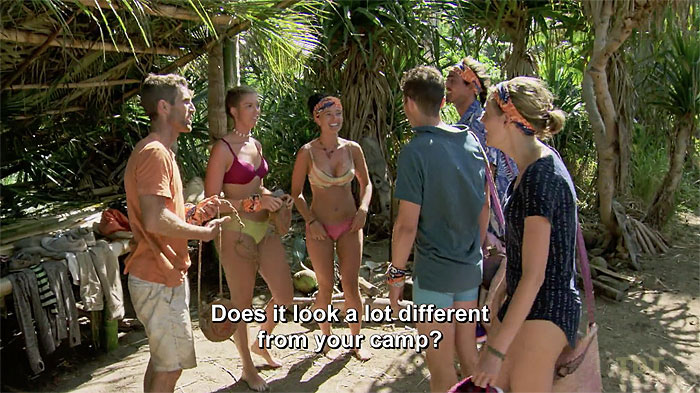
-True respect for Bradley: for bringing his complaining about Malolo camp into the actual game (i.e. not just in confessionals). There's no way that it can possibly pay off, except for the non-stop hilarity as normal, polite people like Brendan hold their tongues, despite Bradley being so rude. It's highly questionable gameplay, but great, entertaining TV.
-Is it too soon... to call original Naviti "Purple Tandang"?
-The perils of the edit: Before the IC, Chris annoys several women (Angela, Libby) with his authoritarian manner, dictating strategy without bothering to listen to any feedback. When Naviti returns from the IC, Domenick mocks Chris for his luck in escaping a certain boot by being sent to Ghost Island. Had those two scenes simply flanked the IC, Domenick probably seems like a good guy, voicing the views of the majority, maybe even standing up for the oppressed. Instead, however, what aired after the IC was emotional footage of Chris, faced with the isolation of his exile, breaking down about his mom, and her decades-long battle with multiple sclerosis (MS). That scene then immediately cuts to Naviti returning to camp, and Domenick voicing his (not unpopular) anti-Chris sentiment. Not a good look, and completely out of Domenick's control. Reality TV is a ruthless judge.
-For a season seemingly singularly focused on Survivor contestants' past decisions, it's strange that almost all the strategy thus far has stemmed from one source: The original tribes, which were a decision made by production, not the players themselves. Malolo vs. Naviti, Chris vs. Domenick. Basically every conflict thus far was set up on Day 1, or before the game even started. Consider the alternative: a schoolyard pick in Episode 1. That would probably have terrified a group of 20 people (most of) who have seen Palau, which would make it work. Apparently some decisions can't be trusted to contestants, though.
 Jeff Pitman is the founder of the True Dork Times, and probably should find better things to write about than Survivor. So far he hasn't, though. He's also responsible for the Survivometer, calendar, boxscores, and contestant pages, so if you want to complain about those, do so in the comments, or on Bluesky: @truedorktimes
Jeff Pitman is the founder of the True Dork Times, and probably should find better things to write about than Survivor. So far he hasn't, though. He's also responsible for the Survivometer, calendar, boxscores, and contestant pages, so if you want to complain about those, do so in the comments, or on Bluesky: @truedorktimes
- Recaps index
- Pre-season: The Ivy Lead - S36 edition
- Pre-season: Ghost Island contestant projections
- Pre-season: TDT Ghost Island contestant draft
- Pre-season: Idol and advantage creep
- Ep.1: The cursed first excursion
- Ep.3: Depth perception
- Ep.4: Idol power has its limits
- Ep.5: The boring 20s
- Ep.6: Outhugged, outpuzzled, outnumbered
- Ep.7: Four notes on reversing the cursed Ghost Island
- Ep.8: Cheers to the merge episode
- Ep.9: Malolo's abandoned last stand
- Ep.10: One and done
- Ep.11: Orange crushed
- Ep.12: Laurel's no-win situation
- Ep.13: The case for no tribes (or one tribe)
- Pre-Ep.14: Jury jeopardy - S36
- Ep.14: Fit to be tied